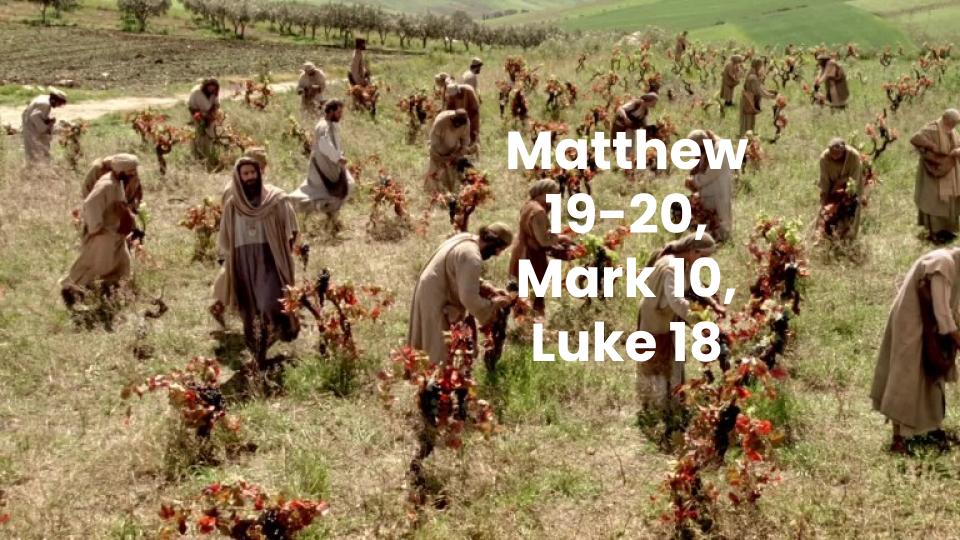Here are some ideas for learning and teaching a few of the great principles in Matthew 19-20, Mark 10, Luke 18. And while you’re here, I recommend you check out my free online course, “Seeking Jesus.”
Short Clips from Seeking Jesus
I’ve pulled out short clips from the “Seeking Jesus Course” connected to this week’s readings that you could use as a morning devotional or spiritual thought.
Follow me on Instagram or sign up here for more Come Follow Me insights.
Ideas for Learning More About Matthew 19-20, Mark 10, Luke 18
***Jesus and Divorce***
Jesus taught “Whosoever shall put away his wife, except it be for fornication, and shall marry another, committeth adultery: and whoso marrieth her which is put away doth commit adultery” (Matthew 19:8-9).
This can be a troubling passage for many people. What have church leaders taught about this divorce? President Dallin H. Oaks said, “In the temples of the Lord, couples are married for all eternity. But some marriages do not progress toward that ideal. Because of the hardness of [our] hearts, the Lord does not currently enforce the consequences of the celestial standard. He permits divorced persons to marry again without the stain of immorality specified in the higher law. Unless a divorced member has committed serious transgressions, he or she can become eligible for a temple recommend under the same worthiness standards that apply to other members.”
Learn more about Christ’s teachings about divorce, and how they apply today, in this Come Follow Me video.
***Comparison***
Anthony Sweat shared this idea with me:
Randomly select two students from your class and tell them to come up front. Tell the class that you are going to give them some candy. Pull out a mini candy bar and give it to the first student. Let the class ooh and ahhh and say things like, “No fair!” and “Lucky!” and whatever other things they might say. Then turn to the second student and pull out his or her candy. Give the second student a king size candy bar (and watch the kids’ reaction. Ask the first student who received the mini candy bar how they feel. Did their feelings change when the larger bar was given to the second student? Why or why not? Does this happen in life? Are we ever happy until we simply see what others have been given and we compare ourselves?
Share with learners the parable of the laborers in the vineyard (Matthew 20:1-16). How does this activity relate to this parable? Select some quotes from this talk by Elder Holland and share them with learners.
***The Servant Leadership Model***
In Mark there’s an interesting pattern around servant leadership. I’ll walk through this, but it would be more fun to teach this to others by having them read through the scriptures and pulling out the pattern for themselves. Here’s the pattern: Jesus predicts his death, his disciples misunderstand—they focus on worldly leadership, and then Jesus explains servant leadership.
In Mark 8:31 we read, “And [Jesus] began to teach them, that the Son of man must suffer many things, and be rejected of the elders, and of the chief priests, and scribes, and be killed, and after three days rise again. And he spake that saying openly” (Mark 8:31-32). So there’s the first prediction. Then Peter misunderstands, “And Peter took him [aside], and began to rebuke him” (Mark 8:32). Peter is thinking, “You’re wrong Jesus. You’re a conquering king, not a suffering one.” Then the Savior teaches servant leadership. In verse 34 Jesus says, “Whosoever will come after me, let him deny himself, and take up his cross, and follow me. For whosoever will save his life shall lose it; but whosoever shall lose his life for my sake and the gospel’s, the same shall save it” (Mark 8:34-35).
That’s the first round of this pattern. It’s going to repeat again. In Mark 9:31 we read, “For [Jesus] taught his disciples, and said unto them, The Son of man is delivered into the hands of men, and they shall kill him; and after that he is killed, he shall rise the third day” (Mark 9:31). Now imagine you’re one of Jesus’ disciples. You’re walking along with him, Jesus announces this, and then he walks ahead a few steps. So now you’re just behind with your fellow disciples. What do you think you would start talking about? Maybe, “Wow Jesus is saying he will be killed. What does he mean? How can we help him out?” Is that what the disciples said?
In verse 33, we read that when they returned to Capernaum Jesus asked his disciples, “‘What were you arguing about on the way?’ But they were silent, for on the way they had argued with one another who was the greatest” (Mark 9:33-34 (NRSV)). Can you see out they are focused on a different kind of kingdom than Jesus is? So once again, Jesus teaches the disciples about servant leadership. In verse 35, “He sat down, called the twelve, and said to them, ‘Whoever wants to be first must be last of all and servant of all.’ Then he took a little child and put it among them; and taking it in his arms, he said to them, ‘Whoever welcomes one such child in my name welcomes me, and whoever welcomes me welcomes not me but the one who sent me’” (Mark 9:35-37, NRSV).
This pattern occurs a third time, starting in Mark 10:32. “[Jesus] took the twelve aside again and began to tell them what was to happen to him, saying, ‘See, we are going up to Jerusalem, and the Son of Man will be handed over to the chief priests and the scribes, and they will condemn him to death; then they will hand him over to the Gentiles; they will mock him, and spit upon him, and flog him, and kill him; and after three days he will rise again’” (Mark 10:32-34, NRSV). When Jesus says this, what’s an appropriate response? Something like “Wow. Thank you, Jesus. We love you. We’re so grateful for you.”
But instead, right after Jesus pours out his heart “James and John, the sons of Zebedee, came forward to him and said to him, ‘Teacher, we want you to do for us whatever we ask of you’” (Mark 10:35, NRSV). What a strange statement! But Jesus, ever patient, says, “‘What is it you want me to do for you?’ And they said to him, ‘Grant us to sit, one at your right hand and one at your left, in your glory’” (Mark 10:36-37, NRSV). So, while Jesus is explaining his death, James and John are focused on who gets the best heavenly seats. And in verse 41 we learn that “When the ten heard this, they began to be angry with James and John” (Mark 10:41 (NRSV)).
Once again, Jesus teaches about servant leadership, saying, “You know that among the Gentiles those whom they recognize as their rulers lord it over them, and their great ones are tyrants over them. But it is not so among you; but whoever wishes to become great among you must be your servant, and whoever wishes to be first among you must be slave of all. For the Son of Man came not to be served but to serve, and to give his life a ransom for many” (Mark 10:42-45, NRSV).
The pattern is clear: Jesus predicts his death, the disciples misunderstand, focusing on worldly power, and Jesus teaches the importance of servant leadership. This is a powerful concept, and we probably have it in our heads, but more importantly, is it in our hearts? Invite learners to take a moment to ponder—how does this pattern relate to you in your life right now, in various areas life?
***
I hope these resources are helpful to you in your learning and teaching this week!
Do you want more learning and teaching tips for Come Follow Me? Follow me on Instagram or sign up here for emails with insights on Come Follow Me.






